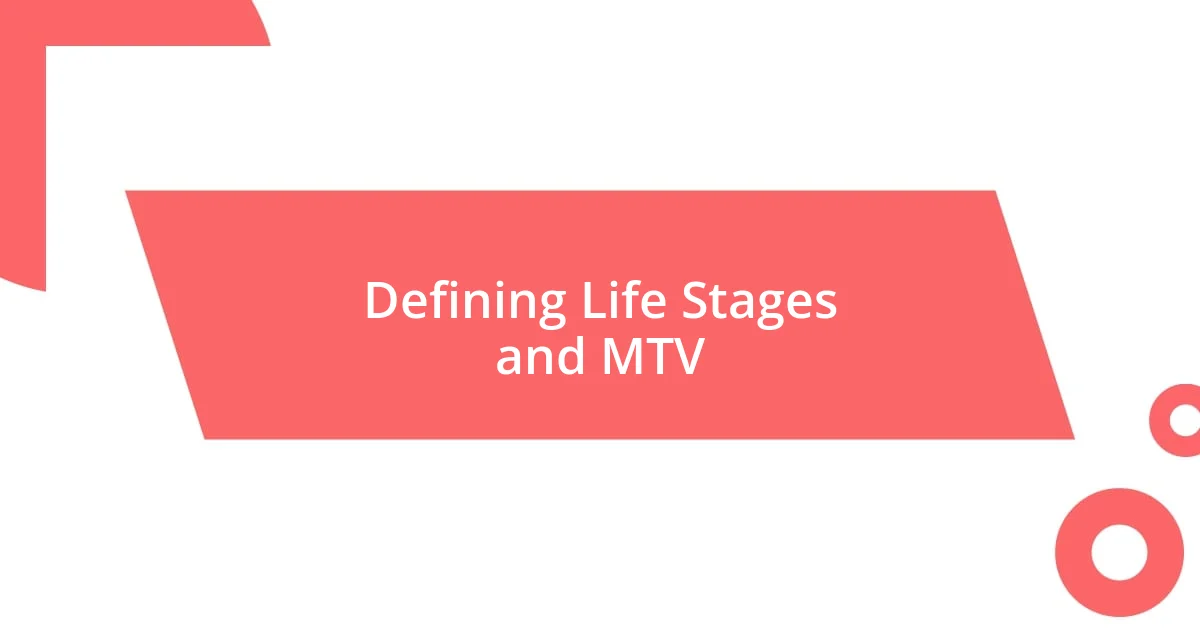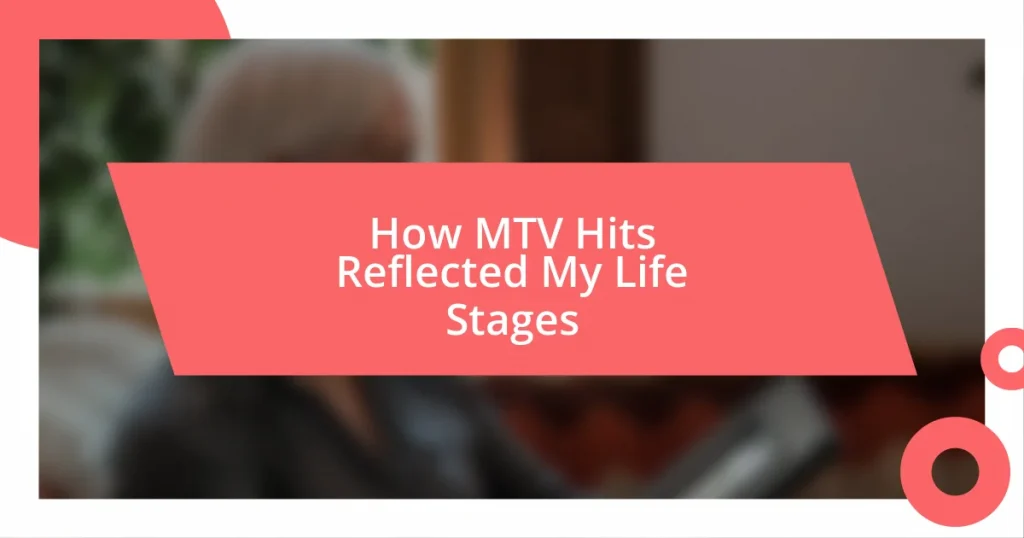Key takeaways:
- MTV significantly shaped cultural identity, influencing fashion, social behavior, and discussions about diversity and acceptance, particularly through iconic artists and reality shows.
- The evolution of MTV mirrored personal life stages, from childhood innocence through teenage identity exploration to adult responsibilities and social awareness, highlighting aspirational and relatable content.
- MTV illustrated the connection between aspiration and reality, emphasizing the interplay of failure and growth in personal journeys, prompting reflections on authenticity and societal pressures.

Understanding MTV’s Cultural Impact
MTV’s cultural impact is colossal, influencing fashion, language, and even social behaviors. I remember flipping through the channels as a kid and being mesmerized by artists like Madonna and Michael Jackson. Their videos didn’t just showcase music; they set trends that we all wanted to emulate. Didn’t you ever find yourself mimicking those music videos with your friends, trying to master those moves?
As the years went by, MTV transformed from a music video channel into a cultural phenomenon that reflected—and sometimes shaped—youth identity. During my teenage years, shows like “Real World” introduced a raw look at diverse lifestyles and experiences. It felt like a window into a world just beyond my reach. How did those candid moments make you feel about your own life stages?
MTV also played a pivotal role in social change, fostering discussions about race, sexuality, and diversity. When I saw artists like RuPaul commanding the stage, it sparked conversations about acceptance and self-expression in my circle. Can you recall moments when MTV challenged your views or made you rethink societal norms? Those reflections have left a lasting imprint on how I perceive cultural narratives today.

Defining Life Stages and MTV
Defining life stages is a way to segment our experiences, often influenced by the media we consume. MTV was more than just a channel; it was a mirror reflecting the ups and downs of growing up. I distinctly remember when my friends and I were in middle school, eagerly discussing “TRL” and how it marked the transition from childhood innocence to the teenage quest for identity. Isn’t it fascinating how those favorite hits served as the soundtrack for our awkward moments?
As I progressed into adulthood, MTV began to feature reality shows that struck a chord with my emerging sense of self. Watching “Laguna Beach” and “The Hills,” I couldn’t help but feel envious of their glamorous lives, yet it also pushed me to pursue my own dreams. Those shows offered a blend of aspirational lifestyles and relatable struggles, making me question what I truly wanted in life. Have you ever found yourself comparing your journey to those portrayed on screen, feeling both inspired and disheartened?
The shifting landscape of MTV reflected my own evolution, transitioning from carefree teenage aspirations to adult responsibilities and social awareness. In my early twenties, shows like “Jersey Shore” made me confront my own expectations of friendship and partying. I often laughed at their antics, but deep down, I wondered if I was making the most of my young adulthood. This connection between MTV’s content and my life stages creates a unique narrative where each hit resonates with an underlying emotional truth.
| Life Stage | MTV Influence |
|---|---|
| Childhood | Influenced by playful music videos and iconic artists. |
| Teenage Years | TRK discussions shaped aspirations and identity exploration. |
| Young Adulthood | Reality shows reflecting and challenging sociocultural norms. |

Lessons Learned from MTV’s Influence
MTV taught me that music and visuals can resonate deeply with our emotions. I still remember the buzz surrounding the release of “Smells Like Teen Spirit.” It wasn’t just a song; it became an anthem for a generation grappling with the angst and confusion of young adulthood. How many of you felt a sense of liberation when that song blasted through the speakers, almost as if it voiced the inner turmoil we kept hidden?
As I navigated my twenties, MTV’s reality shows revealed the rawness of personal journeys that felt eerily familiar. Watching “The Real World” made me question my friendships and the choices I was making. I often found myself reflecting on moments in my own life, wondering if my experiences were authentic or more scripted. Did you ever find comfort in seeing your own struggles mirrored on screen, realizing you weren’t alone in your insecurities?
One key lesson I’ve absorbed from MTV is that failure and growth go hand-in-hand. Shows like “My Super Sweet 16” showcased a glamorous life, but behind the opulence lay a reminder that not everyone is living their best life. I’d watch those parties and think about the pressure to conform to unrealistic expectations. When have you felt that pressure in your own life? This constant interplay between aspiration and reality shaped not just my worldview, but my understanding of success and authenticity.















